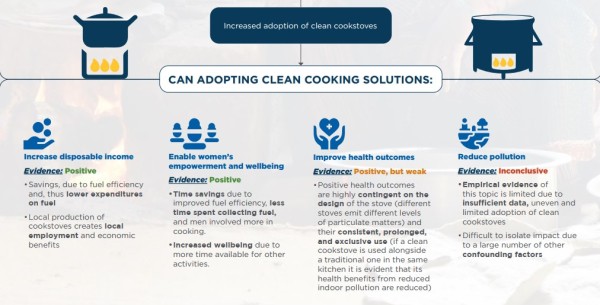


How do clean cookstoves affect health and the environment, and what role do external factors play in the business of clean cookstoves?
Three billion people worldwide rely on solid fuel such as wood, charcoal, or coal for cooking. This traditional cooking method not only negatively affects health by emitting harmful particles into the air, but also the environment and socio-economic conditions, particularly of women.
One solution is clean cookstoves (CCs), which are designed to emit less (or no) particles and use less polluting fuel.
Through its Access to Energy Fund, FMO has invested in clean cooking solutions to ensure access to affordable, reliable, and sustainable energy to promote the use of clean, efficient fuel, thus contributing to the goals of SDG 7 and SDG 13.
To understand the impact of investing in clean cookstoves, FMO commissioned a study that looked at two key areas:
The study’s methodology consisted of a literature review complemented with interviews and one case study.
The study revealed four important impacts of CC use:

It was also vital to look at what is required for the successful uptake of CCs from both the supply and demand sides.
Challenges in accessing cost-effective and timely finance affect both the demand and supply side of the cookstove industry. Capital tends to flow to a small number of high-value deals, and as formal financial institutions are wary of providing credit to CC companies, grant-based financing is often their only source of funds. Of 400-500 CC providers, only about 50 are consistently profitable, and there is little information about the business models and strategies that can improve this.
However, those that pursue a least-cost, best-fit approach appears to be the most successful as they best fit user needs and market conditions.
Carbon credits are popular but are seen as risky, due to market value fluctuations, although LPG and biomass companies have been successful in urban markets, and those offering integrated tool and fuel models have enjoyed some success in raising capital.
On the demand side, although evidence of the effectiveness of asset-based finance (such as PayGo models) is limited, it is still the most promising solution for end-users.
Furthermore, rising fossil fuel costs are spurring demand for fuel-efficient CCs, as they reduce the quantity of fuel needed, and thus boost household savings. What is also needed to boost demand is a greater consumer awareness of the benefits of CCs, alongside business models based on a greater understanding of household preferences if CCs are to have sustained use.
The study also showed that government policy plays a vital role in the cookstove industry. For example, in India and Kenya, the government, through a combination of subsidies and industry-friendly policies, has been instrumental in increasing the adoption of clean cooking methods. These are two of the six countries reviewed in the full report of CCs.
From this study, FMO has gained a number of insights on how to advance the use of CCs. Apart from leveraging local policy to guide investments, there is also a need to understand the investors’ priority outcomes, to invest in human-centric designed CCs, and to consider each market in its local context. Finally, there is a need to plug the knowledge gaps in this market so that investment decisions are easier to make and have more impact.
To download the report, please click here.
You can also download the infographics here and here.
For our other evaluations and reports, visit our reporting center.